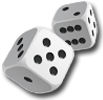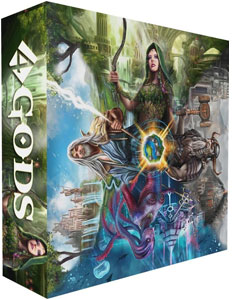



play board games
Board game reviews, strategy tips & session reports
4 Gods Board Game Review
 Stats:
Stats:
No. of players: 2-4
Amount of time to play: 30-45 min
Age requirements: 12+
Set-up time: minimal
4 Gods is a real-time, tile-laying board game. Players make the world simultaneously and then score points based on the size of the areas they control.
4 Gods Rules Description:
You start 4 Gods with two tiles. All the tiles are double-sided and made up of no more than three or the four terrain types, plains, water, mountains and forests. There are no turns but there are eight different actions you can take at any time.
The action you most often take is placing a tile. To place a tile you must match the terrain when it meets another tile and it must be next to two straight edges. That means you start building from the corners and work inward from there. After both your hands are empty you can draw up to two new tiles from the bag.
You may also discard a tile to the edge of the board closest to you. You may never discard more than ten tiles. And if you have one hand free you may flip and/or play tiles from any players’ discard row. If you pick up a tile you cannot return it to that player’s discard row. If you cannot place it, it must go into your discard row.
At any point you may claim a god. Each god is tied to one of the terrain types. The god you pick will score you points based on the size and number of areas consisting of that terrain. When you claim a god you also get its prophets. You use prophets to gain control of areas. When you place a tile you may place a prophet on one of the terrain types on that tile.
You may also place a legendary city. These cities must be placed next to two straight edges. They are round and you place a prophet on them (if you have already claimed a god). At the end of the game you get points for each legendary city you built. Legendary cities can be destroyed. If you place a tile that legally fits the space where a legendary city is, you can place your tile and take that city. The prophet on the city is removed from the game and you will earn points at the end of the game for each destroyed legendary you possess.
The game ends once there are no spaces for tiles or cities left on the map, there are no tiles in the bag or if there are no more moves possible (a rare occurrence). You get points for each area you control that is two tiles or bigger. An area is worth the number of tiles that it is made of minus the number of tiles with prophets on them. Then points are awarded for three largest areas to the player with the matching god. Largest gets 15 points, then 10 points and then 5 points. Also the gods controlling the three largest areas in number gain the same point denominations. Then you get five points for each legendary city you have or have destroyed. The player with the most points wins.
A Quick Review of 4 Gods:
4 Gods is chaotic but fun tile-laying board game. It doesn’t revolutionize the tile-laying genre. But the fact there are no turns definitely makes it unique and plays quick.
The components for this game are really nice. The tiles are durable, the art looks great and the rules are well written.
I like how you score the areas and that the prophets count against your score. It makes fighting over areas not as worth it. And you need to decide where it is worth fighting when you know it will get you less points.
Another decision point is when to grab a god. Do you wait until some areas are established or just grab one and concentrate on its terrain type? It is not a super tense decision but it can make a big difference in your final score.
There are also a couple different ways to play 4 Gods. There is a variation with timed turns and another in which god selection is random.
4 Gods is a unique tile-laying game because of its simultaneous play. It doesn’t overstay its welcome. If you like tile-laying board games you should give this one a try. If you are not a fan tile-laying board games this is not going to change your opinion.
Score and synopsis: (Click here for an explanation of these review categories.)
Strategy 4 out of 6
Luck 5 out of 6
Player Interaction 4 out of 6
Replay Value 4 out of 6
Complexity 3 out of 6
Fun 4 out of 6
Overall 4 out of 6

Leave a Reply